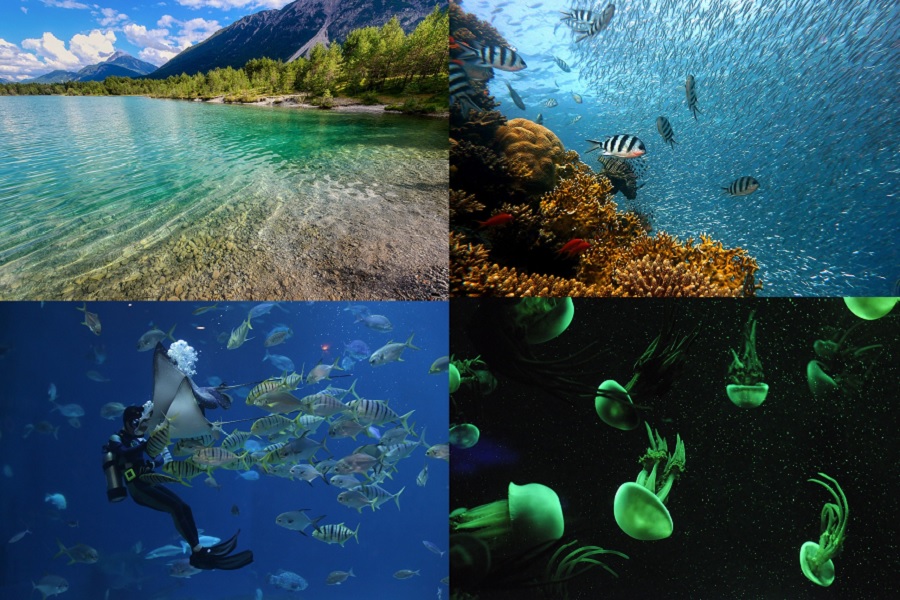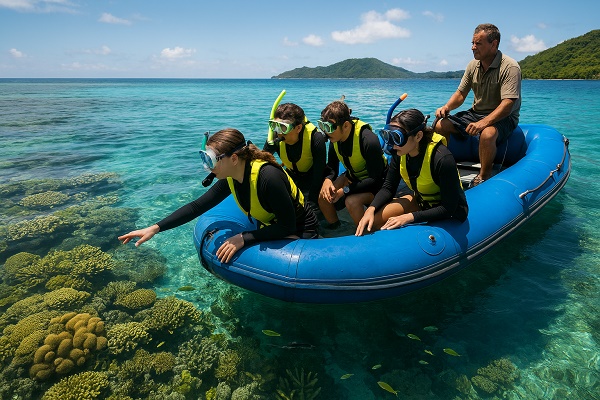Marine Ecotourism: Preserving Oceans While Exploring Their Beauty

Marine ecotourism offers an opportunity for travelers to explore the incredible beauty of ocean ecosystems while contributing to their preservation. Activities like sustainable diving, snorkeling, and whale watching not only provide unforgettable experiences but also play a vital role in protecting fragile marine environments. In this article, we’ll explore how tourists can responsibly engage with marine life, adopt sustainable practices, and support ocean conservation efforts. We’ll also look at how marine ecotourism can reduce human impact on coral reefs, safeguard endangered species, and promote environmental stewardship.
Marine Ecotourism: The Gateway to Ocean Conservation
Marine ecotourism, a rapidly growing sector within the larger ecotourism industry, is centered around engaging with marine life and coastal ecosystems in a sustainable manner. Unlike traditional mass tourism, which often harms the environment, marine ecotourism emphasizes the importance of preserving oceans and marine biodiversity. It fosters an awareness of the delicate balance that exists in marine ecosystems, such as coral reefs, kelp forests, and open waters, and encourages responsible interaction with these environments.
1. Sustainable Diving and Snorkeling: Exploring Without Impact
One of the key components of marine ecotourism is sustainable diving and snorkeling. These activities allow tourists to experience the underwater world up close, offering an opportunity to observe vibrant coral reefs, schools of fish, and majestic marine life like turtles and rays. However, traditional diving and snorkeling practices can harm delicate ecosystems if not done responsibly.
To ensure these activities do not damage the ocean’s fragile ecosystems, tourists are encouraged to follow certain guidelines:
Avoid touching coral reefs: Corals are living organisms, and direct contact can cause irreparable harm. Divers should always maintain a safe distance and avoid touching marine life.
Respect marine life: Marine animals, including fish, turtles, and dolphins, should not be approached or disturbed. Snorkelers and divers should let creatures move freely in their natural habitat.
Choose eco-certified operators: Support diving and snorkeling operators that have been certified for their commitment to sustainable practices, including environmental protection, waste management, and education. These operators provide tours that focus on minimizing the environmental footprint and educating tourists on marine conservation.
2. Whale Watching: Promoting Conservation Through Education
Whale watching is another popular marine ecotourism activity that helps raise awareness about the conservation of marine species. By observing whales and other marine mammals in their natural habitats, tourists can appreciate the scale and majesty of these creatures while understanding the critical need for their protection. However, like other marine activities, whale watching requires responsible practices to ensure minimal disruption to the animals' natural behavior.
To participate in sustainable whale watching:
Respect distance regulations: Tour operators often set guidelines for how close boats can approach whales, dolphins, and other marine mammals. Tourists should ensure that they follow these rules to prevent disturbing the animals.
Avoid noise pollution: Noise can stress marine mammals and disrupt their natural behaviors. Responsible whale watching operators minimize engine noise and movement to ensure peaceful observation.
Support research and conservation: Many whale watching tours also fund scientific research and conservation efforts aimed at protecting whale populations. By participating, tourists can directly contribute to these efforts.
3. Protecting Coral Reefs and Marine Biodiversity
Coral reefs are some of the most biodiverse ecosystems on the planet, but they are also incredibly vulnerable to human activities, such as overfishing, pollution, and climate change. Marine ecotourism encourages travelers to engage with coral reefs in a manner that supports their conservation rather than causing harm.
Here’s how tourists can help protect coral reefs:
Follow no-anchor policies: Anchoring boats on coral reefs can cause significant damage. Many ecotourism operators use mooring buoys to ensure that boats do not anchor on fragile coral beds.
Pick up trash: Visitors to coastal and marine areas should take care to leave no trace, picking up any litter they encounter to prevent it from entering the ocean and harming marine life.
Avoid purchasing coral or marine souvenirs: The collection and sale of coral, shells, and other marine organisms can contribute to the destruction of ecosystems. Tourists should be mindful not to buy souvenirs made from marine life.
4. Sustainable Fishing Practices: A Key Element of Marine Ecotourism
Sustainable fishing practices are crucial to the health of marine ecosystems, especially in regions where fishing is a key part of the local economy. Responsible ecotourism encourages tourists to engage with sustainable fishing practices, such as catch-and-release programs or supporting local fishermen who adhere to sustainable fishing methods.
Travelers can support sustainable fishing by:
Choosing sustainable seafood: While dining, tourists can opt for restaurants and eateries that serve seafood from sustainable sources. Look for certification labels like the Marine Stewardship Council (MSC) that ensure the fish comes from responsible fisheries.
Participating in conservation-based fishing activities: Some marine ecotourism destinations offer catch-and-release fishing programs where tourists can participate in research-driven activities aimed at tracking fish populations and maintaining biodiversity.
5. Supporting Ocean Conservation Organizations
Tourism revenue plays a significant role in funding marine conservation initiatives. Many ecotourism operators partner with organizations that work to protect oceans, coral reefs, and endangered marine species. By supporting these companies, tourists can help fund ocean conservation projects, marine research, and sustainable fisheries management.
Some ways to support these initiatives include:
Donating to marine conservation charities: Several organizations, such as the Ocean Conservancy and the Coral Triangle Initiative, work to safeguard marine ecosystems. Donations can directly fund projects that protect biodiversity and promote sustainable practices.
Joining volunteer programs: Tourists can also participate in hands-on marine conservation activities, such as coral restoration programs or beach clean-ups, while on vacation.
Conclusion: Preserving the Beauty of Our Oceans Through Responsible Travel
Marine ecotourism presents a unique opportunity to explore the beauty of our oceans while contributing to their preservation. By adopting sustainable practices, tourists can play a role in protecting marine ecosystems for future generations. Whether through responsible diving, sustainable whale watching, or supporting local conservation efforts, each mindful action helps ensure the long-term health of our oceans and the wildlife that calls them home.





















